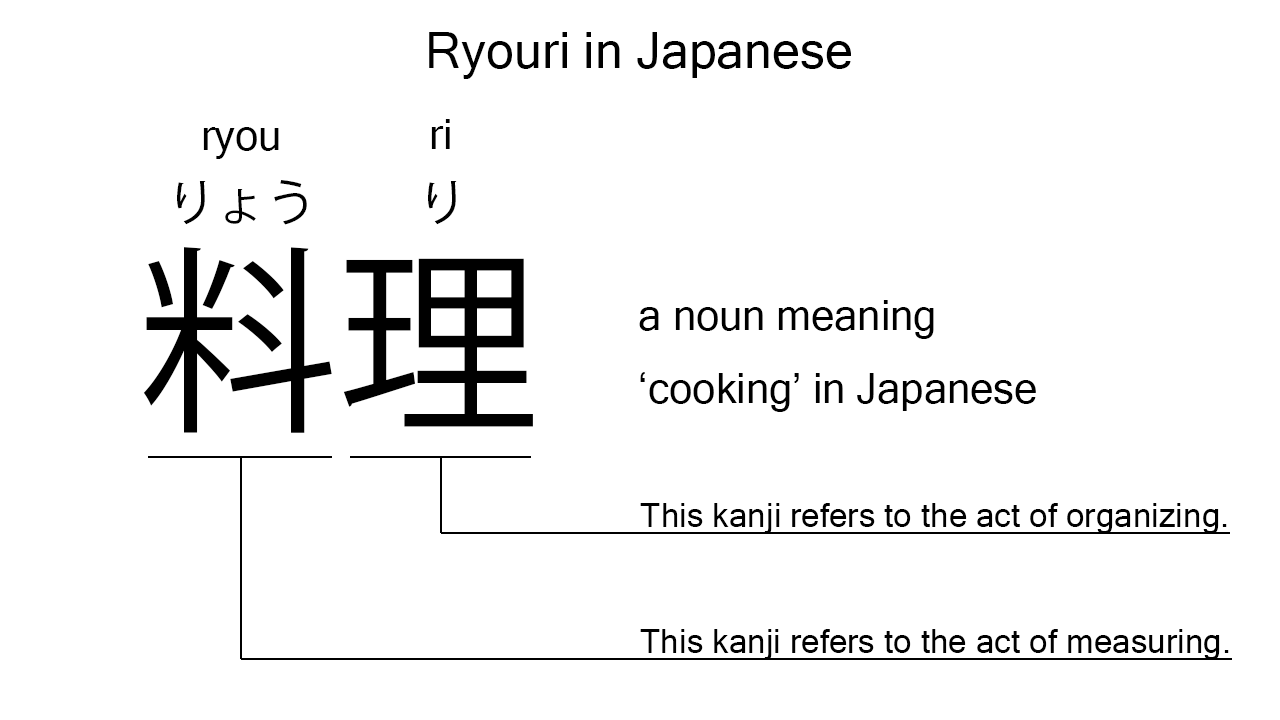What does “ryouri” mean in Japanese?
Native speakers say “ryouri” often to mean ‘cooking’ in Japanese. Perhaps, some Japanese learners know this word as it is sometimes used in Japanese movies, novels, manga, anime, and the like. In this blog post, however, I will explain this word in detail based on its kanji expression. And also, I will explain how to use it through example sentences. My explanations would help Japanese learners understand “ryouri” more clearly. Then, let’s get started!
Contents
Definition and meanings of “ryouri”
Let me start with the definition and meanings of “ryouri”.
- ryouri – 料理 (りょうり) : a noun meaning ‘cooking’ in Japanese. This can also mean ‘dish’ or ‘cuisine’ depending on the context and situation.
Japanese native speakers use this noun to refer to the act of cooking or something already cooked. So, this noun can often mean ‘cooking’ or ‘dish’ in Japanese.
The definition and meanings are simple and clear, I think. To understand this noun more clearly, however, let me explain its kanji characters in detail, one by one.
What does “ryouri” literally mean in Japanese?
The kanji expression of “ryouri” consists of the following two characters:
- 料 : a kanji character used to refer to the act of measuring.
- 理 : a kanji character used to refer to the act of organizing or perhaps putting things in order.
From these two kanji characters, we can understand that “ryouri” literally means ‘measuring and organizing’ in Japanese. This literal interpretation is not in line with the actual meanings, but still makes sense, I think. In Japanese, cooking is considered as the act of measuring and organizing food.

When we meet new kanji expressions, we should check their kanji characters in detail to understand their meanings clearly and deeply. In many cases, kanji characters tell us a lot about the meanings of the expressions they form. Actually, here, we could get the better understanding of “ryouri” through the detailed kanji check above.
So far, I’ve explained the definition and meanings of “ryouri” together with its kanji characters. Then, let me explain how to use it through the example sentences below.
Example #1: how to say “cooking” in Japanese
watashi no chichi wa ryouri ga suki desu – 私の父は料理が好きです (わたしのちちはりょうりがすきです)
My father loves cooking.
Below are the new words used in the example sentence.
- watashi – 私 (わたし) : a pronoun meaning ‘I’ in Japanese.
- no – の : a case particle used after a noun or pronoun to make its possessive case. In the example, this is used after “watashi” to make its possessive case, “watashi no“, which means ‘my’ in Japanese.
- chichi – 父 (ちち) : a noun meaning ‘father’ in Japanese.
- wa – は : a binding particle working as a case marker or topic marker. In the example, this works after “watashi no chichi” to make the subject in the sentence.
- ga – が : a case particle used to make the subject word or the object word in a sentence. In the example, this is used after “ryouri” to make the object in the sentence.
- suki – 好き (すき) : the stem part of the na-adjective, “sukina”, which means ‘favorite’ in Japanese. Native speakers, however, often use this as an individual word to mean ‘to like’ or ‘to love’ in Japanese. In the example, this is used to mean ‘to love’.
- desu – です : an auxiliary verb used after a noun or adjective to make it polite. Probably, this is well known as a part of Japanese desu form. In the example, this is used after “suki” to make it sound polite.
This is a typical usage of “ryouri”. In this example, it works as the object in the sentence and means ‘cooking’ in Japanese. When we want to refer to the act of cooking in Japanese, this noun is always a very good option.
Example #2: another usage of “ryouri”
kono ryouri wa totemo oishii desu – この料理はとても美味しいです (このりょうりはとてもおいしいです)
This dish is very delicious.
Below are the new words used in the example sentence.
- kono – この : a determiner used before a noun which refers to something close to the speaker. In the example, this is used before “ryouri” to say “this dish” in Japanese.
- totemo – とても : an adverb of degree meaning ‘very’, ‘much’, ‘so’, or such in Japanese. In the example, this works in front of “oishii” to emphasize its meaning.
- oishii – 美味しい (おいしい) : an i-adjective meaning ‘delicious’ in Japanese.
This is another typical usage of “ryouri”. In this example, it works together with the determiner, “kono”, to say “this dish” in Japanese. When we want to refer to something already cooked in Japanese, this noun is a very good option.
Summary
In this blog post, I’ve explained the definition and meanings of “ryouri” in detail based on its kanji expression. And also, I’ve explained how to use it through the example sentences. Let me summarize them as follows.
- ryouri – 料理 (りょうり) : a noun meaning ‘cooking’ in Japanese. This can also mean ‘dish’ or ‘cuisine’ depending on the context and situation. Native speakers use this noun to refer to the act of cooking or something already cooked. These two kanji characters literally mean ‘measuring and organizing’ in Japanese. So, in Japanese, cooking can be considered as the act of measuring and organizing food. It still makes sense, I think.
Hope my explanations are understandable and helpful for Japanese learners.